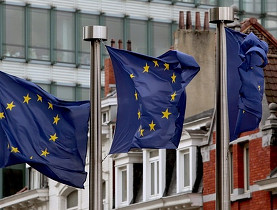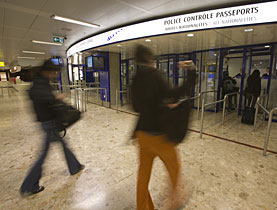Swiss reflect on Schengen progress one year on

On December 12, 2008 Switzerland officially opened its borders to citizens of the Schengen area and broke its physical isolation from its European neighbours.
Systematic checks at the border have been abolished but the fight against crime has become more effective thanks to better international collaboration.
By entering the “borderless” Schengen zone – comprising European Union members (without Britain and Ireland), as well as Norway and Iceland – Switzerland took a step closer to joining the large European club. The Swiss people approved the move in 2005.
Switzerland’s international airports form one of the principal entry points into the old continent. Under Schengen the Swiss authorities have therefore had to assume a gatekeeper role to help tackle the flow of illegal immigrants into Europe from third countries.
Thanks to tighter judicial and police cross-border cooperation, Schengen has become a useful crime-fighting tool. The Dublin Convention, which has also been in force since 2005, has also resulted in better management of asylum requests by member states.
Rigorous checks
“Switzerland is in a special situation seeing as it’s not part of the European customs union,” explained Rodolfo Contin, chief of staff at the Swiss Border Guards HQ.
“Systematic checks on people have been abolished but, unlike other states, other customs controls have been maintained, such as on goods.”
Mobile customs controls in border regions and on the main rail links have been stepped up as compensatory measures, said Contin. At Swiss airports, which were given the Schengen-friendly stamp of approval in March 2009, passenger checks from third countries have become “systematic and rigorous”, he noted.
Yet the system is not infallible. Swiss border guards have been asked to take on additional responsibilities to manage the flow of 650,000 people and 350,000 vehicles that cross national borders every day. But they say they need additional staff.
Both houses of parliament last week supported a motion to increase border personnel and salaries. The senate urged the government to review staffing levels by the end of 2010.
Four kilos of drugs
The head of the Swiss border guards, Jürg North, gave a positive overview of Swiss integration in the Schengen zone and replied indirectly to rightwing fears that Schengen could cause an increase in crime.
North praised stronger cross-border cooperation, partly resulting from the Schengen Information Service (SIS), a database which lists stolen objects, false documents and people wanted by another European country in connection with serious crimes.
“Thanks to the SIS we have identified 5,958 delinquents, of whom 60-70 were particularly dangerous criminals,” he recently told the Südostschweiz newspaper, adding that four kilograms of drugs were seized every day.
Swiss escapades
The Schengen security system also foresees a common visa policy. Whoever is in possession of a three-month Schengen visa to travel to Italy, for example, can visit Switzerland without additional formal procedures.
According to Switzerland Tourism, the introduction of a single European visa has been especially significant for visitors from China, Russia and India.
“For travel agencies, it has become much easier to include Switzerland on European circuits,” said spokesperson Veronique Kanel.
“The simplified administrative procedures have had a striking impact, especially on the Chinese market,” she said. “But it’s still difficult to quantify its influence on the rise in the number of overnight stays by Chinese tourists in Switzerland (+23 per cent) in 2009.”
Schengen’s new coordinated visa regime has also given Switzerland – perhaps unintentionally – a new leverage tool in international affairs. Under the agreement it can veto the allocation of the visas which allow border-free travel throughout the 25 member countries in mainland Europe.
Bern recently asked members of the Schengen zone to implement a restricted visa policy for applications from Libya. This was in return for Tripoli’s refusal to release two Swiss businessmen who Switzerland says are being held illegally in Libya linked to the arrest in Geneva in 2008 of a son of Libyan leader Moammar Gaddafi.
In November Schengen visas were refused to the Libyan prime minister and other top officials. Deputy Foreign Minister Khaled Kaïm denounced a “systematic and programmed solidarity with Switzerland”.
From January 2010 Swiss membership of the Schengen zone will become even more effective with the entry into force of the Swiss law on information exchange with Schengen states. The aim of the new legislation is to accelerate and simplify data exchange to prevent and investigate crimes.
Luigi Jorio, swissinfo.ch (Translated by Simon Bradley)
The Schengen Area comprises 25 countries, most of which are members of the EU, as well as the four member countries of the European Free Trade Association – Iceland, Norway, Switzerland and Liechtenstein.
About 255 million people and 116 million vehicles cross Swiss borders every year.
Britain and Ireland are not in the zone, but they have signed agreements on security.
A key element of the Schengen agreement is the Schengen Information Service (SIS), which includes a huge database in the French city of Strasbourg.
The SIS database enables police in any Schengen state to find out whether a suspect has been involved in any kind of crime across the EU.
The Schengen treaty takes its name from a town in Luxembourg where it was signed by Germany, France and the Benelux states in 1985.
As a member of the Schengen Area, Switzerland has to take on EU laws applicable to Schengen and Dublin. Bern negotiated one exception – references to banking secrecy.
Since the signing of the Schengen treaty in 2004, the EU has officially passed on 71 new laws to Switzerland on the issue.
In one recent change Swiss voters approved the introduction of biometric passports by a very slim margin in May 2009.
Another change is likely to be controversial: Switzerland will have to shorten the maximum length of detention pending deportation from 24 months to 18.
In September 2009 Switzerland and the EU signed a new accord which foresees Swiss participation in Frontex, the EU agency based in Warsaw, which is mandated to coordinate the operational cooperation among member states in the field of border security.
Brussels could also ask Switzerland to make border guards available to monitor its exterior EU borders, i.e. Poland.

In compliance with the JTI standards
More: SWI swissinfo.ch certified by the Journalism Trust Initiative















You can find an overview of ongoing debates with our journalists here . Please join us!
If you want to start a conversation about a topic raised in this article or want to report factual errors, email us at english@swissinfo.ch.